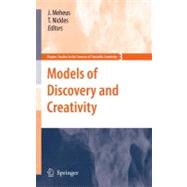
| Foreword | p. vii |
| Preface | p. ix |
| Unexpected discoveries, Graded Structures, and the Difference between Acceptance and Neglect | p. 1 |
| The Conceptual Analysis | p. 3 |
| Nuclear Physics | p. 4 |
| Philosophical Morals | p. 22 |
| Conceptual Comparison and Conceptual Innovation | p. 29 |
| Discovering Mechanisms in Molecular Biology: Finding and Fixing Incompleteness and Incorrectness | p. 43 |
| Introduction | p. 43 |
| Characterization of Mechanisms | p. 45 |
| Revision of Incomplete Schemata | p. 47 |
| Revision of Incorrect Schemata | p. 50 |
| Conclusion | p. 53 |
| On the Role of Thought-Experiments in Mathematical Discovery | p. 57 |
| Archimedes's Method | p. 58 |
| Impossible Numbers | p. 60 |
| Conclusion | p. 63 |
| Experimental Systems, Investigative Pathways, and the Nature of Discovery | p. 65 |
| Abduction as a Heuristic Constraint | p. 81 |
| Introduction | p. 81 |
| The Problem of Abduction | p. 83 |
| Evolutionary Biology | p. 86 |
| Conclusions | p. 92 |
| Creative Abduction and Hypothesis Withdrawal | p. 95 |
| Change in Theoretical Systems | p. 95 |
| Abduction: Sentential, Model-Based, Manipulative | p. 97 |
| Governing Inconsistencies in Abductive Reasoning | p. 104 |
| Withdrawing Unfalsifiable Hypotheses | p. 114 |
| Conceptual Change: Creativity, Cognition, and Culture | p. 127 |
| Introduction | p. 127 |
| Interpreting Conceptual Practices: Cognitive-Historical Analysis | p. 127 |
| Cognition and Culture: Situated and Distributed Cognition | p. 131 |
| Creativity in Conceptual Change: The Role of Model-Based Reasoning | p. 137 |
| Model-based Reasoning as Situated and Distributed Reasoning | p. 153 |
| Culture and Cognition: Implications for Creativity | p. 158 |
| The Strange Story of Scientific Method | p. 167 |
| Introduction | p. 167 |
| Traditional Views of Method and Discovery | p. 169 |
| Scientific Method (So-Conceived) Is Impossible | p. 171 |
| Reasons for Optimism? | p. 181 |
| Two Objections | p. 184 |
| The Triumph of the Darwinian Method? | p. 186 |
| BV+SR: Madness or Method? | p. 190 |
| The Generality Question and the NFL Theorems | p. 198 |
| The Classical Discovery Program Revisited | p. 200 |
| Tradition and Innovation: Exploring and Transforming Conceptual Structures | p. 209 |
| Introduction | p. 209 |
| Taditionalists and Iconoclasts | p. 210 |
| Scientific Structures | p. 212 |
| Applied and Intractable Fields | p. 214 |
| Discovery in the Mature Sciences | p. 216 |
| Exploring Paradigms | p. 218 |
| A Purposeful Alliance in the Service of Creative Research: The Network of Vitamin Investigators | p. 223 |
| Introduction | p. 223 |
| The Significance of Collective Work | p. 224 |
| How are the Results Evaluated from the Current Perspective? | p. 226 |
| How Effective was the Network? | p. 234 |
| Conclusion | p. 235 |
| Index | p. 237 |
| Table of Contents provided by Ingram. All Rights Reserved. |
The New copy of this book will include any supplemental materials advertised. Please check the title of the book to determine if it should include any access cards, study guides, lab manuals, CDs, etc.
The Used, Rental and eBook copies of this book are not guaranteed to include any supplemental materials. Typically, only the book itself is included. This is true even if the title states it includes any access cards, study guides, lab manuals, CDs, etc.